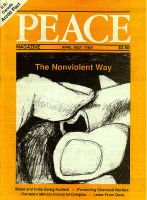
Peace Magazine Apr-May 1988, page 31. Some rights reserved.
Search for other articles by Metta Spencer here
Search for other articles by Jennifer Ramsay here
Search for other articles by John Bacher here
Benyamin Chetkow-Yanoov is a member of Partnership, an Israeli organization in which Arabs and Jews work for peace. Jennifer Ramsay, John Bacher, and Metta Spencer talked with him in Toronto.
Chetkow-Yanoov: We have about fifty active members -- Arabs and Jews who are citizens of Israel--and a support group of three or four hundred. During any year a few thousand people go through our different programs. We're working together, establishing trust, and overcoming confrontations. My own work in this field was to create a peace education curriculum for schools. Partnership holds weekend marathon encounter groups, bringing Arabs and Jews together to gradually overcome stereotypes. But that isn't enough, because these people go back to a hostile environment and their gains get dissipated rapidly. There's no support system. So we decided to do community work, starting in an all-Arab neighborhood in Haifa and now in a mixed neighborhood in Acre. We work with two other peace organizations. They do the grade schools and we do the high schools.
There are too few opportunities for Jews and Arabs to meet each other in natural settings. Even when they live close by, there's social segregation. You see Arabs as waiters, as cleaning people, as laborers, but not at home with their children. You don't see them as academics at universities. Encounters succeed if they are structured, educationally sound, and if with excellent leaders -- usually an Arab and a Jew, modeling as well as teaching about it. And yet more is required, so we are forming a coalition with some human rights groups to lobby for changes in certain laws. We want a meaningful law against racist behavior. Israel doesn't have such laws so far.
Spencer: Is there any interest in integrated schools?
Chetkow-Yanoov: Some organizations are trying to do this on a small scale. For example, two teachers decided to teach a unit on Japan together. They met alternately in one school, then the other, both classes, both teachers, they studied in Hebrew and Arabic about Japan. They put out a flyer at the end, half in Hebrew, half in Arabic, about Japan. That is sound.
Getting back to your question, there's a grave fear, going back many centuries, that if there were integration between Arabs and Jews there would be a lot of intermarriage. That is one reason for the schools being segregated. We wind up separate but not equal. The school budget should be allocated on a per capita basis.
Bacher: Do you have projects in the occupied territories?
Chetkow-Yanoov: No, we just don't have the resources.
Spencer: During one of your encounter groups, are there regular stages that people go through?
Chetkow-Yanoov: Yes, first people are shocked to discover that the other side looks normal. They've been fed rumors and media images. "You mean they don't have horns? They don't stink?" So it's almost shock therapy at the beginning. You're confronted with the stereotypes that you've assimilated. Around the middle stage there's the "aha!" stage, where you suddenly realize that you've been wrong, and you have this admission to yourself. It's a psychological slap on the forehead. Then there's overflowing goodwill, desire to make amends, desire to learn, a kind of euphoria. But everybody goes home and it evaporates, unless you do follow-ups.
Bacher: I saw reference to a joint community of Jews and Arabs.
Chetkow-Yanoov: Neveh Shalom. It's very successful. It's a small semi-agricultural community, called a moshav, in which Palestinian and Jewish families live together as one community. Their major income-producing business is a peace school. That's where we do many of these weekends. Their school is bilingual and tricultural. You learn about the different faiths in two languages, starting in nursery school. We do teacher training. Last summer we trained nursery school teachers.
It's important to have an ongoing resocialization process while you're doing political change. If the political change succeeds, you have to be able to move with people who aren't frightened and aren't furious. Some long-time Israeli citizens are frightened at the prospect of peace. The prospect of having to relate in a different way is upsetting. Even surveys of Jewish high school students find them very right wing and hostile to Arabs, mostly from ignorance. A fifteen year old doesn't know that there was a time when we didn't have occupied territories. He's been fed propaganda -- that these are the enemies and we have to rule them.
No emergency that lasts forty years stays an emergency; it becomes another kind of pathology-- closed-mindedness. The technology for intervening in these situations exists today. We just haven't the resources to do them massively. We know from small scale projects that it can work.
Bacher: Can Jews from outside Israel enter your programs?
Chetkow-Yanoov: We often have one-year interns from outside. It's good. Actually, what helped me in Israel was my previous experience in the civil rights movement in Indianapolis. What I had learned became relevant, and I wasn't caught up in the Israeli pressure. I could see more objectively without getting angry.
I'm trying to contribute to peacemaking and peace teaching. My country is a good example of how desperately it's needed. I really bless the growing interest in the teaching of peace.
To order Prof. Chetkow-Yanoov's curriculum guide for junior and senior high school teachers,send $10 U.S. plus postage to him at School of Social Work, Bar-Ilan Univ., Ramat, Israel.

Peace Magazine Apr-May 1988, page 31. Some rights reserved.
Search for other articles by Metta Spencer here
Search for other articles by Jennifer Ramsay here
Search for other articles by John Bacher here